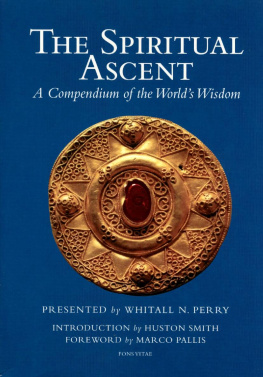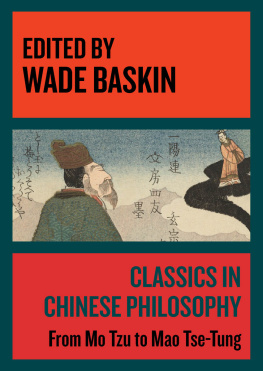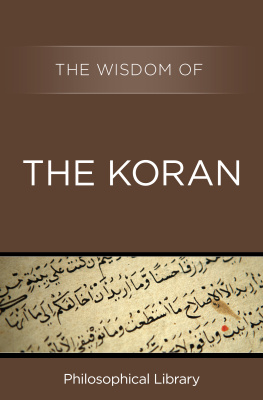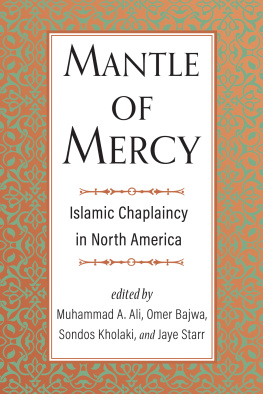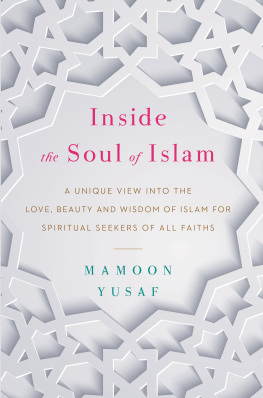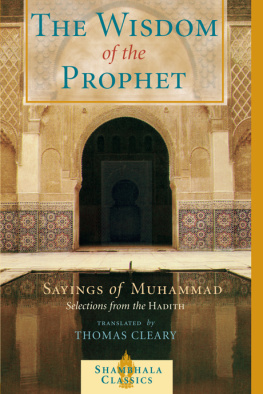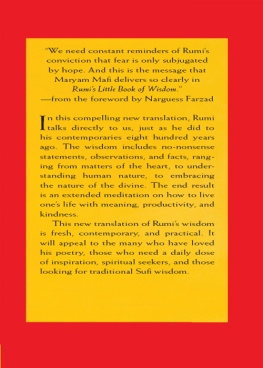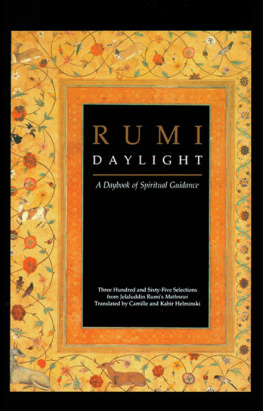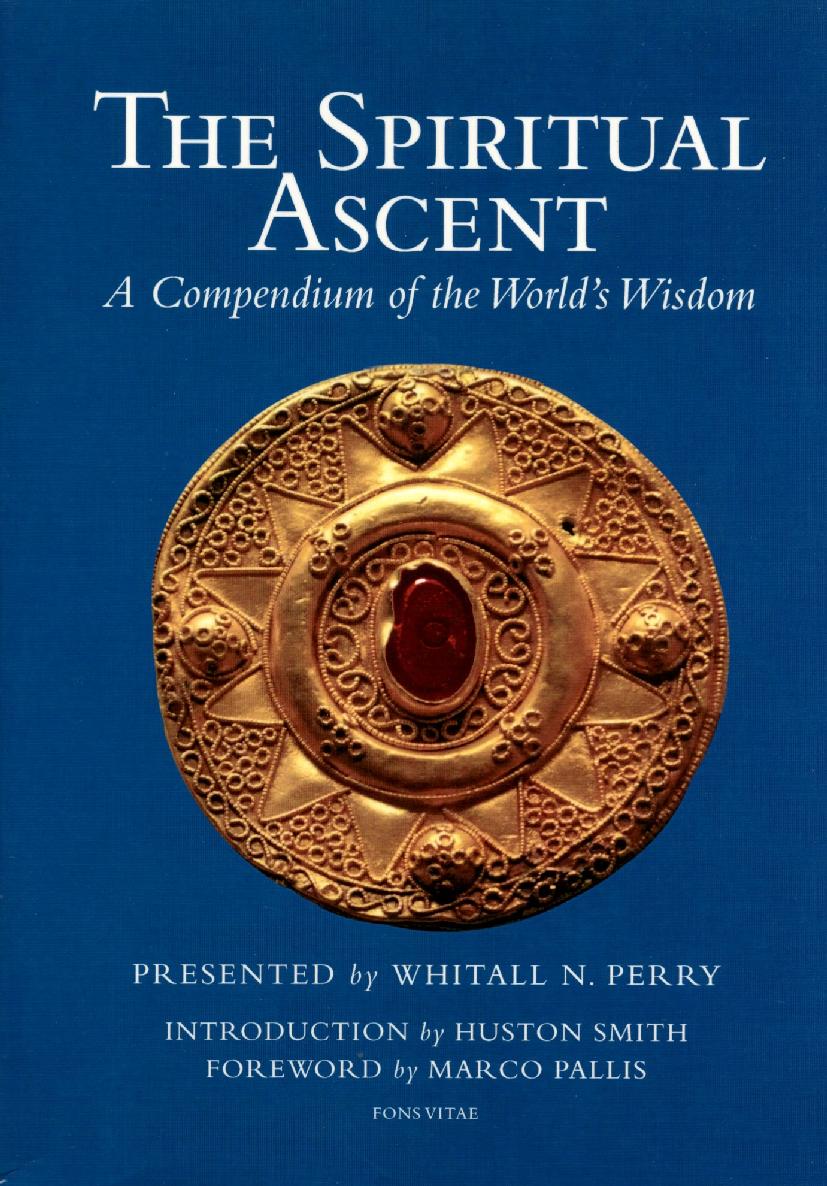
A Treasury of Traditional Wisdom
Presented by
Whitall N. Perry
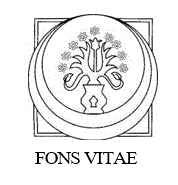
Fons Vitae Edition published 2000
First published 1971, United Kingdom
Fons Vitae
49 Mockingbird Valley Drive
Louisville, KY 40207
http://www.fonsvitae.com
Copyright Fons Vitae 2007
Library of Congress Control Number: 2007939137
ISBN 1-887752-048
No part of this book may be reproduced in any form without prior permission of the publishers.
All rights reserved.
Silver and gilt broach with garnet inlays of possible Vandal origin circa 5 th 6th century CE, found in Krym (Crimea).
Photograph courtesy of the British Museum.
Whitall Perry at an early age became interested in Platonism and Vedanta. Even before college, his contactsthrough travels in the Near, Middle and Far Eastwith Islamic, Hindu, and Buddhist cultures left deep-rooted impressions, and after a short term at Harvard, he chose to return directly to the living sources of his elected field. In 1946 he came under the close personal influence of A. K. Coomaraswamy, and from then until 1952 resided in Egypt, where he enjoyed a continuing relationship with Ren Gunon. He had intimate personal ties with the foremost authorities in Hindu, Buddhist and Islamic orders, as well as with Roman Catholic and Orthodox contemplative circles. The author counted many personal friends among the American Indians with whose sages in particular he was familiar.
Whitall Perry has made contributions on metaphysical and cosmological subjects to various journals, including Studies in Comparative Religion.
(5)
PREFACE
by Huston Smith
Marco Pallis Foreword to this book introduces it so well that all my Preface needs to do is welcome it home from England (where it carried the imprint of Perennial Books) and celebrate its entrance into the mass market through this paperback format.
If a classic is a book that refuses to stay out of print, this third edition speaks well for the book in its own right. But there is more involved. That the new issue is in paperback speaks well for the reading public, which seems to be maturing. It is as if those in the West are beginning to remember something the triumphs of science had led them to forget. Even before computers, it was estimated that human knowledge was doubling about every ten years, and this heady growth spawned the prospect that knowledge itself might save us. What we are coming to see is that it cannot possibly do that. Just as no number of five-year plans adds up to the millennium, no amount of knowledge adds up to wisdom, for knowledge can be misused. Only wisdom cannot be.
Enter this Treasury of Traditional Wisdom and its importance for our times. To be sure, wisdom cannot be banked in libraries and disseminated in classrooms the way knowledge can be. All of us must acquire it for ourselves through experience and effort, the way athletes must build their own muscles. In this volume we find our coaches, and for the training of the human spirit, this book assembles their instructions on a scale no previous study approaches. One marvels at the sweep of the volume, which, as Marco Pallis observes, is more like a library than a single book. All of the great wisdom traditions are represented, including oral ones such as those of the Native Americans. Even more, though, one marvels at the way the editor has played these traditions as if they were keyboards on a vast organ. Their doctrines are not soft-pedaled, but they are arranged in a way that brings out a soaring descant: their counsels on how we should live if the heights of the human opportunity are not to be forfeited through ignorance and neglect.
A marvelous unity emerges. Details on how the traditions differ have been wisely bracketed to permit the basic route of the human pilgrimage to emerge in clear relief. Anyone who is interested, not just in reading maps, but in going somewhere with his or her life, will find this the most comprehensive guide that has been compiled.
(7)
FOREWORD
by Marco Pallis
One of the paradoxical aspects of the crisis of doubt, defeatism and disillusion through which the Western world is passing at the present time is the existence, among the educated public in all countries, of a never-ending demand for information concerning religious teachings and practices in all times and climes. Hardly a day passes without some freshly translated text, complete with editorial comments of greater or lesser competence, being added to the list of works in print. Metaphysical treatises of the profoundest kind, records of mystical experience in every conceivable form, instruction on yogic methods formerly only divulged to initiates, illustrations of the treasures of sacred art ranging from sumptuously produced volumes down to picture postcards of no small qualityall this is continually going to swell the spate of religious documentation. To which must be added all that the anthropologists have been able to find out about tribal civilizations in Africa, Polynesia and the Americas, their spiritual lore and accompanying rites and customs. What for the Nineteenth Century amounted to sheer superstition, childish when not abominable and in any case beneath the notice of sophisticated men, is now, on closer examination, found to provide food for envy more readily than for contempt.
On the part of Christians, whose own faith has been partially or largely eroded, this wish to know how the various non-Christian traditions have severally regarded the function of man upon this earth and its eventual outcome is not an unhealthy sign under present circumstances, even though it may often result in further diluting an existing intellectual lukewarmness or else lead to an addiction for one of the many forms of religious charlatanism that characterizes times of general decadence. It is against such a background that a work like this great Anthology of the Spiritual Life can be seen to have an immediate usefulness inasmuch as it can help to canalize the attention of the serious seeker in directions likely, if intelligently and persistently followed, to be fruitful of positive results.
In this same connection it is noteworthy that this century of ours, for all its vast and various discontents and because of them, has been productive of some of the most clear-sighted and heart-searching commentaries that the West has ever known, among which those of Ren Gunon and, more especially, Frithjof Schuon provide pre-eminent examples: it is indeed a long time since anything of this intellectual order has been heard in Europe and the fact that such a thing could happen now of all times is yet another paradox worthy of careful attention. Small wonder that the author of our Anthology, in his preambles to the various sections into which this immense work is subdivided, has quoted repeatedly and with telling effect from the above-mentioned writers.
One other contemporary writer has been freely quoted by the present anthologist in the course of various explanatory notes: this is Ananda K. Coomaraswamy, who first became known through his masterly studies of Art and later through studies of the Indian doctrines of rare lucidity. Coomaraswamy made no secret of his respect for the two writers
(8)
mentioned above: speaking as an Oriental (he was really of mixed parentage) he declared that, with one addition, he knew no other writers who were fully qualified in our time to build an intellectual two-ways bridge between the Indian and European wisdoms. Like them, Coomaraswamy stands for the Philosophia Perennis, not by way of any personal eclecticism but as one for whom traditionally diverse forms, still as valid as ever, have become transparent to the point of ceasing to oppose any impenetrable barrier to metaphysical insight. Having corresponded, myself, with A. K. Coomaraswamy during all the last part of his life, I can say with certainty that had he lived to see the present Anthology published he would have welcomed it and done his utmost to get it known and used both in America, where he made his home, and in India where he felt he belonged by ancestry and temperament.
Next page
